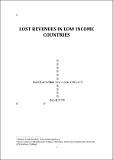Files in this item
Lost revenues in low income countries
Item metadata
| dc.contributor.author | Curtis, Mark | |
| dc.contributor.author | O'Hare, Bernadette Ann-Marie | |
| dc.date.accessioned | 2017-11-11T06:30:09Z | |
| dc.date.available | 2017-11-11T06:30:09Z | |
| dc.date.issued | 2017-08-10 | |
| dc.identifier | 250642309 | |
| dc.identifier | 99eda7ae-2c7d-4864-b976-3176c4c05bec | |
| dc.identifier.citation | Curtis , M & O'Hare , B A-M 2017 ' Lost revenues in low income countries ' pp. 1-27 . < http://curtisresearch.org/wp-content/uploads/Lost-revenues.pdf > | en |
| dc.identifier.uri | https://hdl.handle.net/10023/12057 | |
| dc.description.abstract | This research estimates how much revenue six low income countries – of which five are in sub Saharan Africa - are losing unnecessarily from various potential revenue streams that could be used to fund public services. In recent years, increased attention has been paid to government revenues lost to tax evasion and to tax incentives given to corporations. However, few attempts have been made to estimate losses for a larger number of potential revenue streams. This task is critical given the massive under-funding of public services, and the extent of need, in Low Income Countries. Developing countries can lose revenue in a variety of ways. Here we estimate how much is being lost from the following sources: Corporate tax avoidance by multinational companies Providing tax incentives (for example, reductions or exemptions from the payment of corporate taxes) which constitute government ‘tax expenditure’ Not collecting taxes from a proportion of business activity in the informal sector Corruption in the national budget Debt interest payments to international creditors. The responsibility for these revenue losses lies partly with foreign and partly with domestic actors. Multinational companies are depriving governments of revenues by failing to pay fair taxes. Many companies also receive tax incentives, which reduces their tax payments to governments still further. Governments could themselves be doing much more to stop the leakage of revenues. They could do much more to tax parts of the currently informal sector, which often comprise businesses operating under the radar of the tax authorities but which should pay their fair share of taxes. They must also do more to prevent corruption in the budget, which means that a proportion of public money allocated to support public services is often simply lost in the system somewhere. Both foreign and domestic actors need to ensure that low income countries are also paying back a fair proportion of the debt interest they owe, but no more than that. | |
| dc.format.extent | 27 | |
| dc.format.extent | 924601 | |
| dc.language.iso | eng | |
| dc.relation.ispartof | en | |
| dc.subject | HB Economic Theory | en |
| dc.subject | R Medicine | en |
| dc.subject | SDG 16 - Peace, Justice and Strong Institutions | en |
| dc.subject.lcc | HB | en |
| dc.subject.lcc | R | en |
| dc.title | Lost revenues in low income countries | en |
| dc.type | Working or discussion paper | en |
| dc.contributor.institution | University of St Andrews. School of Medicine | en |
| dc.contributor.institution | University of St Andrews. Global Health Implementation Group | en |
| dc.contributor.institution | University of St Andrews. Infection and Global Health Division | en |
| dc.identifier.url | http://curtisresearch.org/wp-content/uploads/Lost-revenues.pdf | en |
This item appears in the following Collection(s)
Items in the St Andrews Research Repository are protected by copyright, with all rights reserved, unless otherwise indicated.

